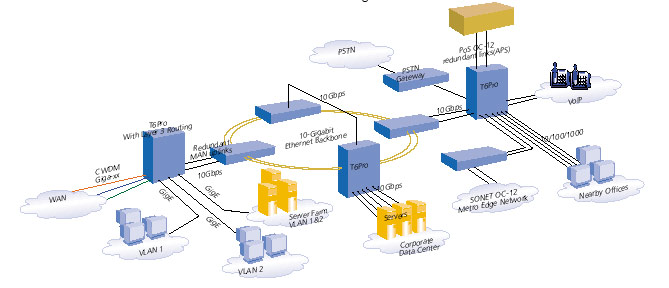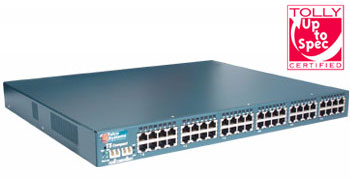Carrier
Class Metro Core Switch- QoS Switch-Metro-Core Routing Switch- Nebs Compliant
Switches- Metro-Core Switches
American Tele Data
Tele Data carries Telco Systems’ T6Pro multi-layer, multi-service Metro-Core
routing switch introduces the state-of-the-art AdvancedTCA™ standardized
platform architecture, with uncompromising
security features, superb QoS, MPLS
awareness, IPv6 dual stack support, and many more
capabilities in a single
12U platform.
The
T6Pro’s NEBS compliant architecture is optimized for the connectivity requirements
of
signaling and media gateways. Non-blocking connectivity of 10/100/1000M
and
10Gigabit Ethernet, POS, ATM and EOS services delivers a flexible, service-rich
platform
with uncompromising carrier-grade reliability. Redundant CPU modules,
switching modules,
and power supplies guarantee maximum up time and 99.9999%
availability.

The
T6Pro’s resident BiNOS (BATM Inter Networking Operating System) software
anticipates
the administration, management, and security performance requirements
of carriers
networks by supporting a breadth of IEEE standards and industry
conventions, such as
Access Control Lists. Hardware based implementation of
BiNOS-mandated policies
enables the T6Pro to perform Layer 2 switching and
Layer 3 routing at wire speed.
T6Pro is optimized for metro core and large-scale
distribution applications, where high
port density is crucial. The 14-slot
or 6-slot T6Pro platforms support many service types
with a range of high-density
modules. All module types are interchangeable between
T6Pro and T6Pro-C..
West
Coast (866) 342-3721 ------East
Coast (866) 650-DATA

Carrier-Class
Optimized Metro-Core Routing Switch
T6Pro
Optimized Metro Routing Switch
Carrier-Class
Optimized Metro-Core Routing Switch
Telco
Systems’ T6Pro multi-layer, multi-service Metro-Core routing switch introduces
the
state-of-the-art AdvancedTCA™ standardized platform architecture,
with uncompromising
security features, superb QoS, MPLS awareness, IPv6 dual
stack support, and many more
capabilities in a single 12U platform.
The
T6Pro’s NEBS compliant architecture is optimized for the connectivity requirements
of
signaling and media gateways. Non-blocking connectivity of 10/100/1000M
and
10Gigabit Ethernet, POS, ATM and EOS services delivers a flexible, service-rich
platform
with uncompromising carrier-grade reliability. Redundant CPU modules,
switching modules,
and power supplies guarantee maximum up time and 99.9999%
availability.
The T6Pro’s resident BiNOS (BATM Inter Networking Operating
System) software anticipates
the administration, management, and security performance
requirements of carriers
networks by supporting a breadth of IEEE standards
and industry conventions, such as
Access Control Lists. Hardware based implementation
of BiNOS-mandated policies
enables the T6Pro to perform Layer 2 switching and
Layer 3 routing at wire speed.
T6Pro is optimized for metro core and large-scale
distribution applications, where high
port density is crucial. The 14-slot
or 6-slot T6Pro platforms support many service types
with a range of high-density
modules. All module types are interchangeable between
T6Pro and T6Pro-C.

T6Pro
switches are fully manageable using leading In-band (IB) or Out-of-Band (OOB)
management
tools.
Administrators can use industry-standard SNMP-based network management
systems, or
BiNOSCenter, Telco Systems' EMS/NMS Element/Network Management
System.
BiNOSCenter provides the network operator a powerful, state-of-the-art
tool for SNMPbased
configuration, monitoring and maintenance.
To directly
access units, Telco Systems switches support a robust Command Line Interface
that
complies with the de facto industry standard. Web-based management is possible
using
an embedded Java™ based management technology.
•
Carrier-Class Metro Core Routing Switch
• Standardized AdvancedTCA™
architecture
• MPLS & IPv6 support
•Choose your platform
•
14-slot, 12RU
• 6-slot, 4RU
• Interchangeable Modules
•
Carrier Class features such as:
• NEBS
• Non-Blocking connectivity
of 10/100/1000Mbps and 10-Gigabit Ethernet
• CPU & Matrix card redundancy
•
Advanced distributed power supply dual feeding method to any card
• BiNOS
on board
• Pluggable transceivers for ultimate Flexibility
• CWDM,
long-haul optics and Bi-Directional transceivers support
•Transparent
LAN services for end-to-end tunneling services
• DHCP Relay & Server
with option 82 support
•Access Control Lists for enhanced network security
•Out-of-Band
management port
• Low power consumption
Standards
IEEE 802.3 CSMA/CD method and physical layer specifications
IEEE 802.1d Spanning
Tree Algorithm
IEEE 802.1p Priority Queuing
IEEE 802.1q VLAN tagging
IEEE 802.1w Rapid Spanning Tree
IEEE 802.1s Multiple Spanning Tree
IEEE
802.1x Authentication
IEEE 802.3x Flow Control
IEEE 802.3 Ethernet
IEEE 802.3u Fast Ethernet
IEEE 802.3z Gigabit Ethernet
IEEE 802.3ac VLAN
Tagging
IEEE 802.3ad Link Aggregation
IEEE 802.3ae 10Gigabit Ethernet
(Draft)
RFC 768 UDP
RFC 791 IP
RFC 792 ICMP
RFC 793 TCP
RFC
826 ARP
RFC 854 Telnet Client & Server
RFC 862 Echo Protocol
RFC
863 Discard Protocol
RFC 867 Daytime Protocol
RFC 868 Time Protocol
RFC 904 Exterior Gateway Protocol Formal Specification
RFC 919 Broadcasting
Internet Datagrams
RFC 922 Broadcasting Internet Datagrams in the Presence
of Subnets
RFC 951 BootP
RFC 1024, 1035 Domain names
RFC 1027 Using
ARP to Implement Transparent Subnet Gateways
RFC 1042 Standard for the Transmission
of IP Datagrams over IEEE 802 Networks
RFC 1058 RIP
RFC 1059, 1119 NTPv1/2
RFC 1112 IGMP
RFC 1122 Host Requirements
RFC 1166 Internet Numbers
RFC 1191 Path MTU Discovery
RFC 1256 ICMP Router discovery protocol
RFC
1267 A Border Gateway Protocol 3 (BGP-3)
RFC 1305 Network Time Protocol, NTPv3
RFC 1332 The PPP Internet Protocol Control Protocol (IPCP)
RFC 1334 PPP Authentication
Protocols (specifies PAP)
RFC 1350 TFTP
RFC 1388 RIP Version 2 Carrying
Additional Information
RFC 1403 BGP OSPF Interaction
RFC 1519 CIDR (Classless
Inter-domain Routing)
RFC 1542 Bootstrap Extensions
RFC 1548 The Point-to-Point
protocol
RFC 1587 OSPF NSSA
RFC 1619 PPP over SONET/SDH
RFC 1638 PPP
Bridging Control Protocol (BCP)
RFC 1661 PPP
RFC 1701 Generic Routing
Encapsulation
RFC 1702 Generic Routing Encapsulation over IPv4 Networks
RFC 1723 RIP V2
RFC 1771 BGP4*
RFC 1745 BGP4/OSPF*
RFC 1765 OSPF Database
Overflow
RFC 1812 Requirements for IP Version 4 Routers
RFC 1851 The ESP
Triple DES Transform
RFC 1866 HTML
RFC 1965 Autonomous system configuration
for BGP
RFC 1966 BGP Route Reflection*
RFC 1989 PPP Link Quality Monitoring
RFC 1994 PPP Challenge Handshake Authentication Protocol (CHAP)
RFC 1997 BGP
Communities Attribute*
RFC 2131 DHCP Server
RFC 2132 DHCP Options and
BOOTP Vendor Extensions
RFC 2138 RADIUS
RFC 2139 RADIUS Accounting*
RFC 2236 IGMPv2
RFC 2328 OSPF V2
RFC 2338 VRRP
RFC 2362 PIM-SM/DM
RFC 2370 The OSPF Opaque LSA Option
RFC 2439 Route Flap Damping
RFC 2453
RIPv2
RFC 2474 DiffServ Precedence
RFC 2475 DiffServ Core and Edge Router
Functions
RFC 2597 DiffServ Assured Forwarding
RFC 2598 DiffServ Expedited
Forwarding
RFC 2644 Directed Broadcasts
RFC 2697 A Single Rate Three Color
Marker
RFC 2698 A Two Rate Three Color Marker
RFC 2792 DSA and RSA Key
and Signature Encoding for the KeyNote TMS
RFC 2865 Remote Authentication
Dial In User Service (RADIUS)
RFC 3046 DHCP Relay Agent Information Option
RFC 3084 COPS-PR*
RFC 3140 PHB Identification Codes
RFC 3222 Forwarding
Information Base (FIB)
DVMRP v3*
GMRP, GVRP, RSVP*, SSH2, PVST, SNMPv3,
IGMP snooping, BiNOS enable
* - future implementation
Switching Characteristics
Technology:
ASIC based parallel Store-and-Forward
Bridging:
IEEE 802.1d
Spanning Tree Algorithm
Address Table:
16K MAC addresses
Forwarding
Rate:
Up to 148,800 pps / 100 Mbps ports
RFC 1587 OSPF NSSA
Flow Control:
802.3x for full duplex. and back-pressure for half duplex transmission
RFC 1701 Generic Routing Encapsulation
Based
in Foxboro, Massachusetts, Telco Systems is committed to leading the industry
in the development of transport, access, and packet products for carriers' COs,
Co-Los, and POPs, as well, enterprise solutions for FTTH, SOHO, hospitality, education,
and MTU/MDU. Integrating circuit- and packet-switched technologies onto flexible
platforms ensures cost-effective operation
Multi
Service Access
VoIP
Channel
Banks
T1/E1 Electrical-to-Optical Converters
Frame Relay
Integrated
Access
Mini DCS
Multiplexers
FTTH
Battery
Backup .
 Telco T- 5
Compact Switch
Telco T- 5
Compact Switch
"The
results show that Telco Systems' T5 Compact outperforms Cisco's Catalyst 2950G-48
convincingly in every test performed"- Click
Here
Cost-effective,
high-performance, ultra-compact IP solution
NEBS
Compliant
Dense 10/100 Mbps copper configuration provides high capacity in
a small space
Choice of fiber interfaces for uplink
Cost-effective port
trunking capabilities
Non-blocking architecture provides maximum data throughput
West
Coast (866) 342-3721 ------East
Coast (866) 650-DATA







 Telco T- 5
Compact Switch
Telco T- 5
Compact Switch






